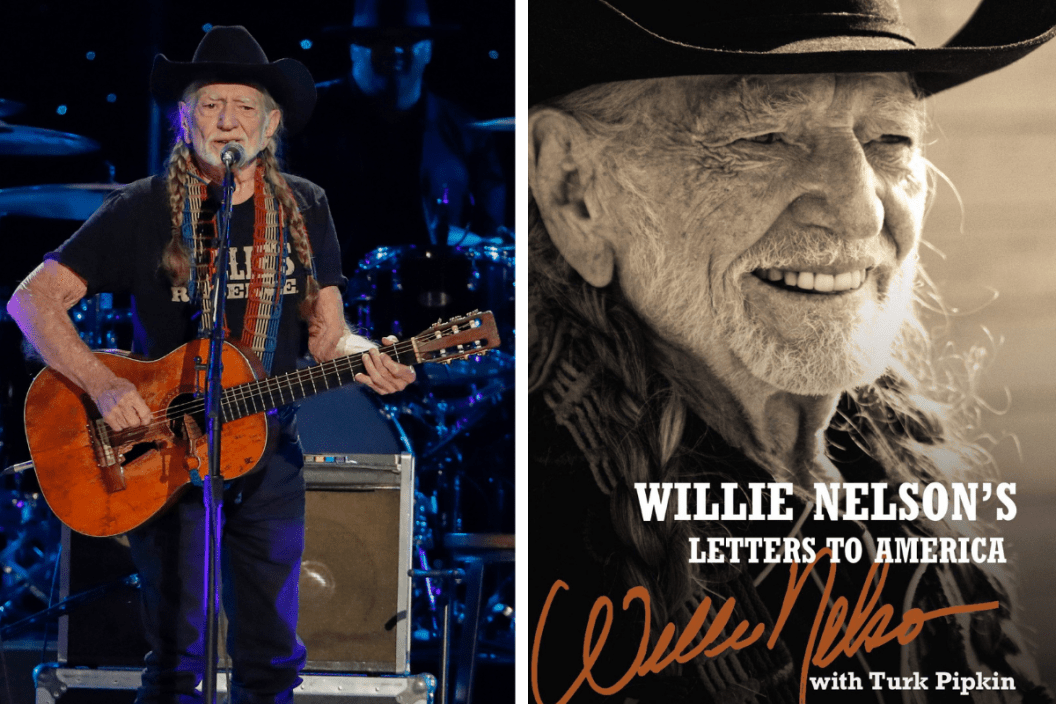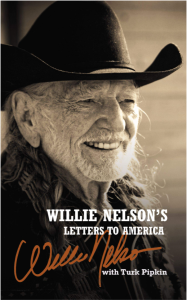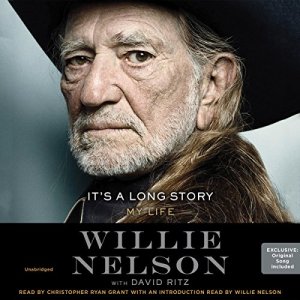"Luckily, I play myself better than anybody," Willie Nelson says, reflecting on his film career in his new memoir Willie Nelson's Letters to America. In that sense, Letters to America is yet another similar role for the outlaw musician. Told entirely through anecdotes, lyrics, and, yes, letters, Nelson reinforces his image as a serene and thoughtful entertainer. The book, like its narrator, is easygoing. Some poetic recollection here, a dirty joke there. There's a rambling quality. I imagine that sitting down to share a joint with Nelson would feel something like the pages of Letters to America.
Videos by Wide Open Country
Dear Willie...
Nelson's new book was compiled during the pandemic. And it shows. Stuck at home, the 88-year-old musician had a lot of time to think back on his long life. And the meandering subject matter feels like a symptom of that (overly) pensive time. Rather than take any narrative approach, as his past memoirs do, Letters to America reads something like a stream-of-consciousness address. Characters are mentioned, briefly, then re-appear for big close-ups. Relationships are centered. Breakthroughs, like the formation of country music's outlaw movement and penning Patsy Cline's "Crazy," occur in passing. As afterthoughts. Everything is an afterthought to a man with so much to say.
Read More: Have You Heard Willie Nelson's Gay Cowboy Song?
Now, just as Letters to America hits shelves (the publication date was June 29), Nelson is getting back on the road again. The world is finally opening up! What a frenzied time to look back on quarantine musings. Still, it's necessary. And Nelson relishes his role as a socially distant storyteller.
In the book's opening letter, "Dear America," the country legend makes his mission is clear: he wants to reach as many Americans as possible. And his agenda is simple. In broad strokes, Nelson cuts between national tragedies -- Covid, the Great Depression, the Civil War, and 9/11 -- to reinforce his characteristic ideals of unity. As Nelson describes it, the book is about the "endless promise and continuous obligations of all Americans." We haven't heard anything before, but the progressive plea feels authentic bolstered by the experiences and memories shared through further letters.
Though Letters to America features various essays, it's the letter-writing that defines his latest memoir. Some recipients are totally abstract -- "Dear Luck," "Dear Road," "Dear Time" -- while others are exceedingly literal: "Dear Pocket." (My personal favorite? "Dear Covid-19," which begins "F*ck you.") Nelson also addresses notes to personal heroes, old friends, and some of his closest family members, like the beloved Bobbie Nelson. Kirkus Reviews, accurately, calls the project "an epistolary grab bag of memories, lyrics, jokes, and homespun philosophy." And that bouncing, blunt meditation goes far in shedding light on Nelson's creative approach.
"Don't think 'the truth' is limited to your truths and that you only have to write what you know. Maybe it's better to write what you know plus what you see, what you hear, and just what comes to you. Whatever it is write it down." -- from Willie Nelson's Letters to America
The Lyrics
Within its wily chapters, Willie Nelson's Letters to America also contains an extensive music catalog. Each letter and essay is grounded by the track it inspired, sometimes indirectly. The lyrics to some of Nelson's greatest hits and some forgotten ditties are included in full between each section of prose. The backstory behind each piece is fascinating enough, but to see the words italicized there on the page invites further reflection. The moment of pause between stories will be appreciated by readers, as Nelson charges on through the chronicles of his wild life.
In recalling the inspiration behind so many songs, Nelson often gets off track. But his inconclusive trains of thoughts only emphasize the genius of Nelson's lyric history. The songs make sense and ascribe their own truths, even if Nelson can't quite explain why. He's a songwriter! That's his way. More than anything, Letters to America is an illumination on the songwriting ethos, in which inspiration appears at once enigmatic and straightforward. As Nelson goes on, tongue-in-cheek commentary turns into sincere sorts of poems. His tone, always, proverb-like. His observations, frank. And his advice, fatherly and familiar: Think positive!
Just some of the songs included in Letters to America are "Family Bible," "Three Days," "Me and Paul," "Yesterday's Wine," "Texas," "These Are Difficult Times," and of course, "On the Road Again." The printed collection, in its own way, feels like a new album -- albeit one of the old hits.
Read More: 20 of the Best Willie Nelson Songs
Willie Nelson's Letters to America was co-authored by Turk Pipkin, an editor at Texas Monthly who also co-wrote 2006's The Tao of Willie: A Guide to the Happiness in Your Heart. Out from Harper Horizon, you can purchase the book now on hardcover, audiobook, or Kindle at the link above. Hardcore Nelson fans -- you're gonna want to add this to your wishlists. And for those of you still curious about the life of Shotgun Willie, check out Roll Me Up and Smoke Me When I Die, Me and Sister Bobbie: True Tales of the Family Band, and Nelson's bestselling memoir from 2015 It's a Long Story: My Life.
Products featured on Wide Open Country are independently selected by our editors. However, when you buy something through our links, we may earn a commission.







